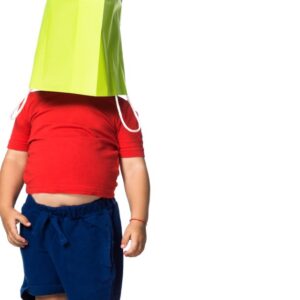If you notice a toddler rocking back and forth, should you worry?
The grandma in this question has a 2-year-old toddler who rocks back and forth every time he sits down, and she is worried that there’s something wrong with him.

Grandma’s Question:
My grandson, who is 2 years old, always rocks back and forth in every chair he sits in, no matter what he is doing, eating, watching TV, etc. What is this all about? Is he sick somehow, or is this normal for a toddler?
Pat
Toddler Rocking Back And Forth: When To Worry
When Rocking Can Be Considered Normal
Don’t worry too much about your son’s rocking; it is likely normal! Many children from six months on use rocking to soothe themselves.
When you think about it, what do most parents do when trying to soothe a baby? Rock them! Sometimes, while in the womb, they experience movements similar to that rocking motion. Some babies even rock and hit their heads rhythmically against their cribs!
Body rocking is one example of rhythmic movements – often a normal infant development phase. Other kinds of repeated movement are head banging, head rolling, and body rolling.
Usually, toddlers grow out of it between 18 months old to 5 years of age. It’s most common at nine months old, an age where nearly a whopping 60% of infants have some form of rhythmic movement.
If the body rocking lasts for less than 15 minutes at a time, doesn’t cause serious injuries, and doesn’t affect your child’s other daily activities, it is probably normal.
When Can Rocking Be a Problematic Behavior in Toddlers?
While rocking for self-soothing can still be normal at this age, the behavior might also indicate illness or developmental issues. Parents should worry if their child is still rocking back and forth by the time they turn five years old.
Sleep-related Rhythmic Movement Disorder
In sleep-related rhythmic movement disorder, rocking back and forth usually happens when babies get sleepy, right before falling asleep, and during sleep time. They sometimes act grumpy and irritable during the mornings or have a hard time getting a good night’s sleep.
Here’s a baby who is self-soothing in in another unusual way – by hitting her head when trying to go to sleep. This article also brings up sleep-related rhythmic disorders, which is when the rocking, head banging, or similar is frequent and violent enough to disrupt the child’s sleep.
Developmental Delay
Consider some developmental delay if your toddler has been rocking back and forth so intensely that he seriously injures himself or is rocking all day (not just at night). A pediatrician should assess this situation.
In developmental delays, children take a little longer to develop their physical, social, or language skills. While developmental delay may be related to other conditions, including being born premature, it may have no known cause.
You’ll find toddler development milestones here.
Autism Spectrum Disorder
Autistic children sometimes rock or make other repetitive motions. Most children with autism have abnormalities in movement. There is no specific age where this starts to happen, though.
Other probable signs of autism for his age are repetitive or restrictive behaviors – repeating words again and again, lining up toys and objects, and getting attached to certain routines.
But, if your grandson responds normally, makes eye contact, and tries to communicate, there is probably nothing to worry about as of now. If you have other concerns about his responsiveness or development, then by all means, check with his doctor.
You can read this guide about early autism signs and symptoms.
I want to show you a video that includes clear examples of how Autistic children may behave compared to children that do not have ASD. The children in this video are older, but I still think the comparisons are valuable to watch as they clearly show rocking and other repetitive behaviors that may be related to autism.
Rocking Caused by Pain
Of course, if your grandson appears to be ill, the rocking could be to mitigate pain. A doctor should see him in this case.
But from how you describe his behavior – rocking when in a chair while watching TV, eating, etc. – I suspect he has associated eating, TV, etc., as comfortable, soothing activities when in a chair, and rocking just adds to his comfort.
How To Act As A Parent When A Child Is Rocking Back And Forth
The first thing to do as a parent is to try to determine why your toddler is rocking. Don’t hesitate to contact a pediatrician to rule out health-related or developmental reasons.
When your toddler starts rocking, don’t try to stop the behavior by verbal or physical corrections, as you may end up reinforcing the rocking rather than the opposite by the attention you give to it!
For young children, including toddlers, distraction is an excellent way to deal with unwanted behaviors. Just ignore the rocking or positively grab your child’s attention by talking, playing, or singing together.
Sometimes, children rock back and forth because they are understimulated and bored. However, since your grandson is rocking while looking like he’s doing enjoyable things, this is probably not the case for him.
He is a lucky wee boy to have a concerned Grandma; enjoy your time with him.
Regards
Paula
Research Reference
- Flapping, Spinning, Rocking, and Other Repetitive Behaviors: Intervening With Young Children Who Engage in Stereotype
- Nathan J. Blum, Chapter 65 – REPETITIVE BEHAVIORS AND TICS, Editor(s): William B. Carey, Allen C. Crocker, William L. Coleman, Ellen Roy Elias, Heidi M. Feldman, Developmental-Behavioral Pediatrics (Fourth Edition), W.B. Saunders, 2009, Pages 629-641, ISBN 9781416033707,
https://doi.org/10.1016/B978-1-4160-3370-7.00065-1. - Rhythmic Movement Disorder

Paula Dennholt founded Easy Baby Life in 2006 and has been a passionate parenting and pregnancy writer since then. Her parenting approach and writing are based on studies in cognitive-behavioral models and therapy for children and her experience as a mother and stepmother. Life as a parent has convinced her of how crucial it is to put relationships before rules. She strongly believes in positive parenting and a science-based approach.
Paula cooperates with a team of pediatricians who assist in reviewing and writing articles.






